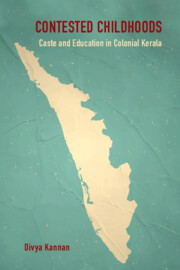Introduction
Published online by Cambridge University Press: 28 November 2024
Summary
In colonial Kerala, how and why were poor children educated, and how did schooling become integral to childhood formation? These overarching questions frame the narratives detailed in this book. Although mentioning ‘Kerala’ and ‘education’ in the same breath may seem trite for some, an exploration teasing out the historical configurations of schooling is pertinent to understand the shifting cultural and political values associated with the Malayali child. Today, with the steady removal of children from agricultural and industrial labour, a declining fertility rate, smaller family units, increasing global migration, and commercial values accrued by families from an accumulation of certified educational skills, the Malayali child has become almost ‘emotionally priceless’, to use Viviana Zelizer's incisive term.1 However, since the second half of the twentieth century, this transition from an ‘economically useful’ to an ‘emotionally priceless’ child, marked by long years of familial protection and institutionalized schooling, has mostly occurred within urban, middle-class communities in south India, similar to the European and American contexts. The traditionally rich, landed upper castes, and literate families have looked upon schools as a worthwhile investment to segregate and mould their children into productive, gendered adult household members, workers, and citizens.
With this context in mind, this book moves away from the scholarly attention overwhelmingly paid to dominant social groups to reveal the parallel dynamics which shaped the construction of ‘poor childhoods’ in Kerala during the nineteenth and early twentieth centuries. Here, ‘poor’ refers to the conditions of poverty and deprivation suffered by children belonging to oppressed castes and religious communities, including Christian converts, and the ways in which the circular logic of poverty shaped the schooling landscapes into which they were brought.2 As upper-caste and upper-class communities in colonial Kerala slowly embraced universalist notions of childhood innocence and vulnerability advocated by various local and transregional actors in state and non-state agencies, and agreed on the separation of children from adults in spaces specific to play, study, and leisure, those from labouring, low-caste communities continued to be largely viewed through the lens of pity and charity, subject to mechanisms of disciplinary control and humanitarian governance with little acknowledgement of their agentic selves.
- Type
- Chapter
- Information
- Contested ChildhoodsCaste and Education in Colonial Kerala, pp. 1 - 34Publisher: Cambridge University PressPrint publication year: 2025

